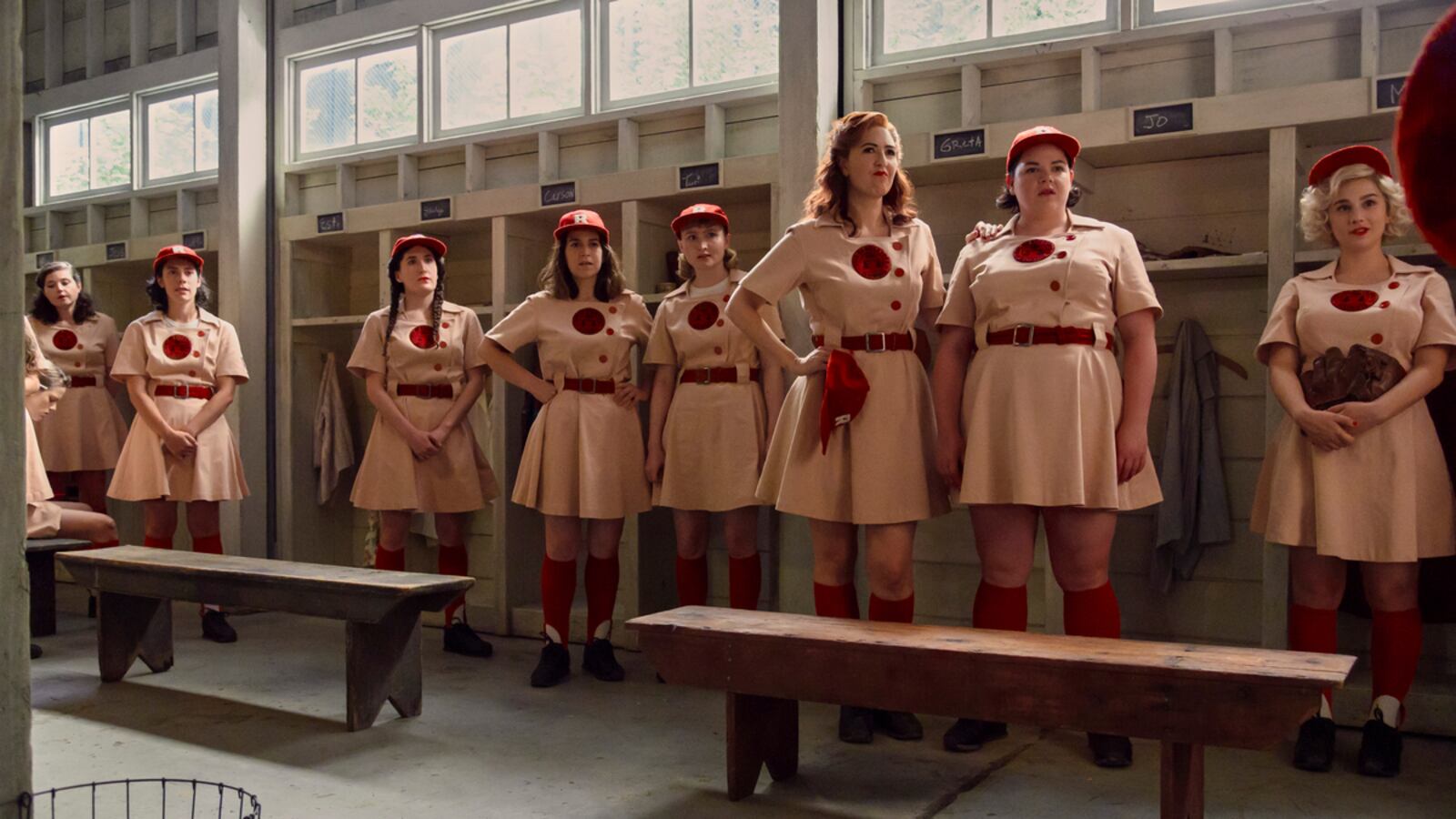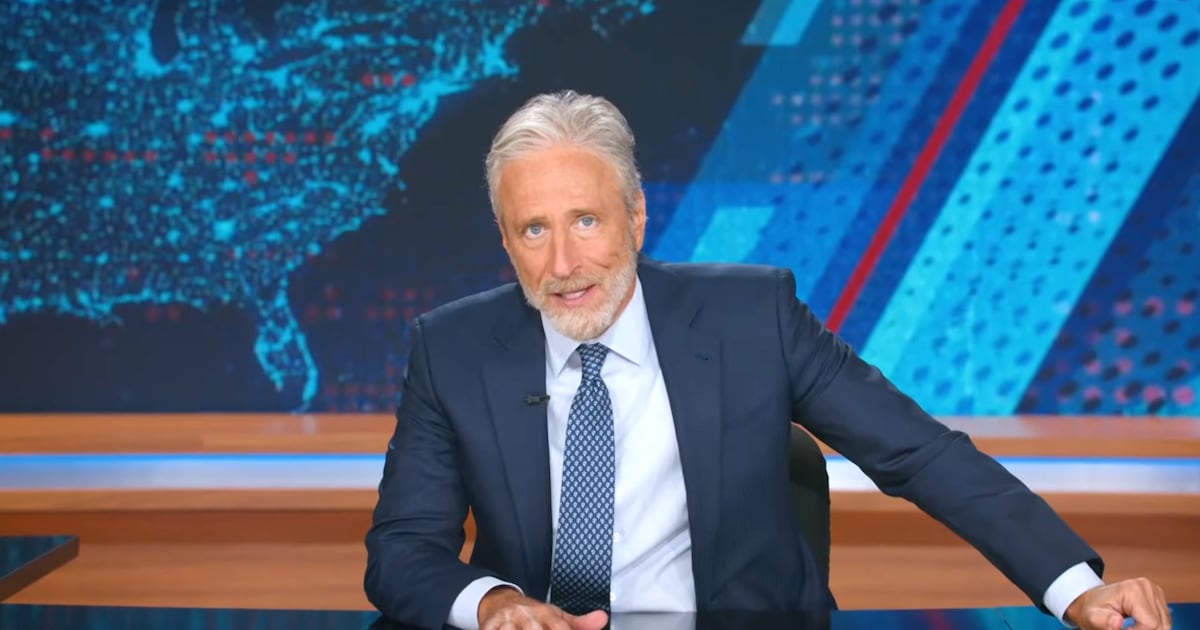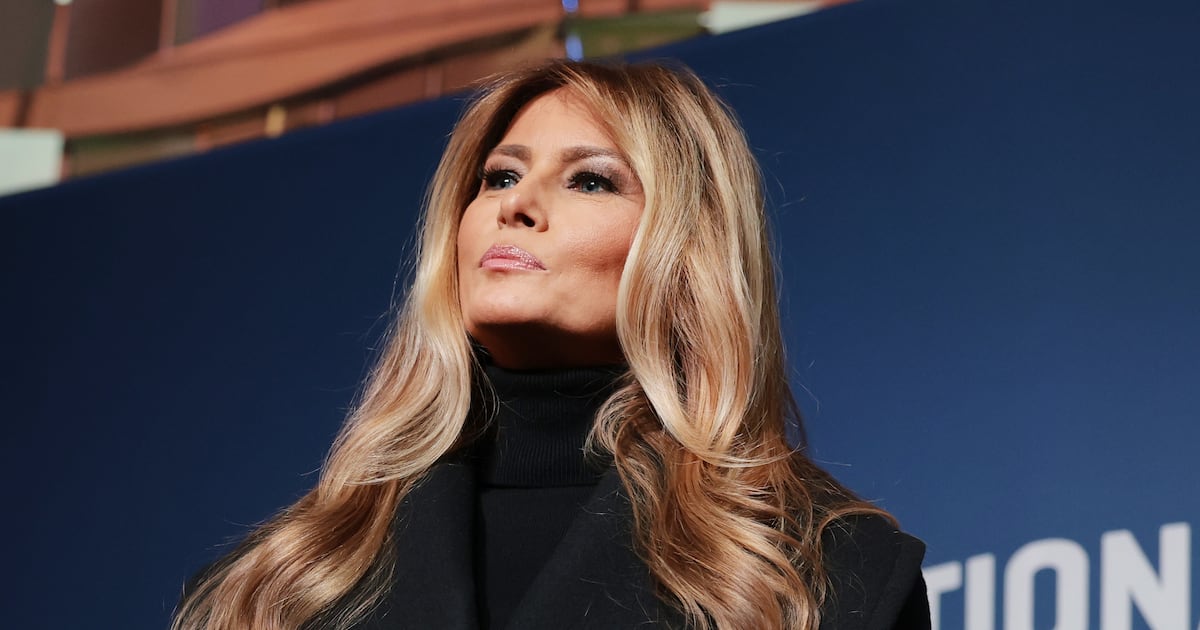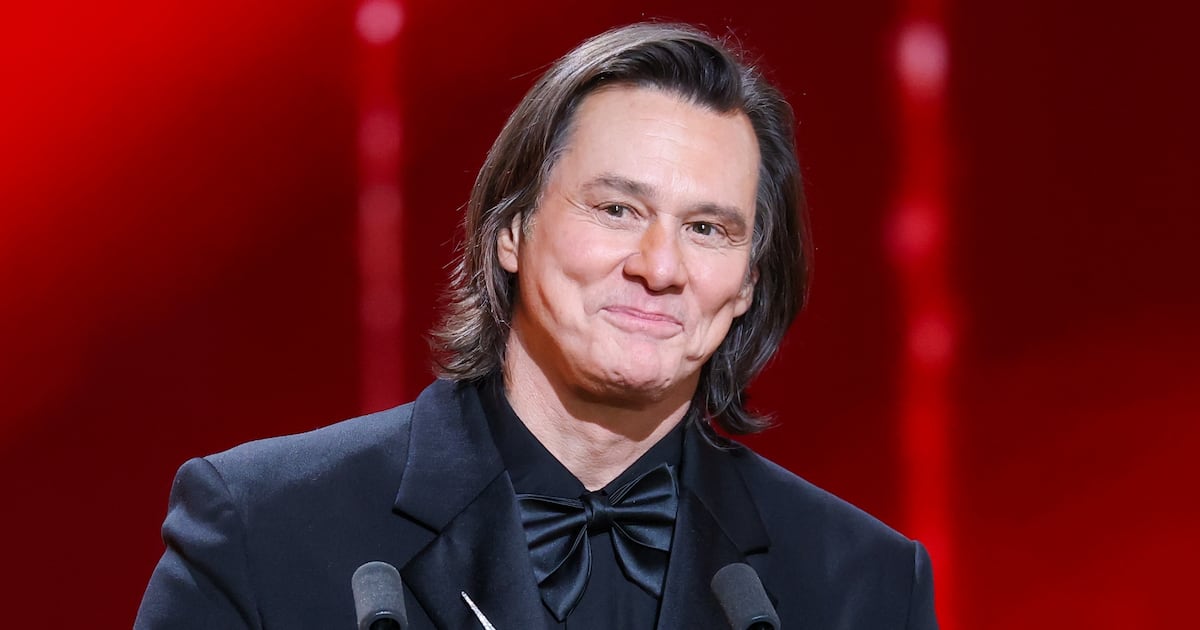It’s time to admit it: Prestige television is largely mediocre. It seems good while you’re watching it, but it’s smoke and mirrors—big-name streamers pour millions into new shows, causing style to be mistaken for substance. When you look back months later at a show you thought you enjoyed, can you still name more than three things you loved? Can you ascertain one reason you kept watching, other than, “Eh, I guess since I started it I should see what happens”?
A League of Their Own is, remarkably, the antithesis of this “golden age” of televised deception. Remakes aren’t supposed to be good anymore. Ask the 47,000 think pieces about it that have been written in the last 10 years. Admittedly, Hollywood is devoid of new ideas, and would rather guarantee a return on their investments by frankensteining an old project with nothing new to say. But this new series is so surprisingly, refreshingly good.
Amazon Prime’s serialized reboot of the beloved 1992 film about the Rockford Peaches—a real-life team in the All-American Girls Professional Baseball League (AAGPBL) formed during WWII—has all the trappings of faux-prestige programming. There are a few familiar faces in the ensemble cast, a cameo from the original film, and the rebooting of an adored, massively influential film to cap off the allure.
By all accounts, this could’ve been another streamer-dumped dud, here today and forgotten as a foul ball tomorrow. Instead, A League of Their Own is a bat-breaking, base-rounding, out-of-the-park home run. Look at us using sports words! That’s how impressed we are!

Co-created and starring Broad City’s brilliant Abbi Jacobson, A League of Their Own resurrects the Rockford Peaches for an original take on the revolutionary team’s inception, this time without shying away from exploring the realities of the political, social, and cultural obstacles that the women on the team were actually facing in 1942. Though Penny Marshall’s original film did occasionally touch on the Peaches’ plight as women in a sport traditionally occupied only by men, it focused much more on their impact on the game and less on how the women grappled with being disrespected and underestimated off the field.
A recent rewatch left me feeling like the film was particularly insular, especially looking back from 2022. Perhaps Marshall didn’t cover such a wide breadth of history because she couldn’t read it all with such famously tiny glasses—there were so many perspectives left unseen, so much of the real lives of AAGPBL players, that are finally reflected in the new series.
In the new version, co-created by Will Graham, Jacobson stars as Carson Shaw, a housewife and amateur baseball player who flees her humdrum life when she hears of a new women’s baseball league holding tryouts in Chicago. When she arrives, she meets Greta (D’arcy Carden) and Jo (Melanie Field), two more experienced players whose confidence shines so brightly it nearly knocks Carson to the ground. At the tryouts, they scope out their competition and impress the scouts forming the league—Jo with her arm, Carson with her bat, and Greta with her speed and sex appeal.
All three women eventually make the team, along with a handful of other misfit players, who each have their own lovable eccentricities. During the tryouts, a young woman named Max (Chanté Adams) and her best friend Clance (Gbemisola Ikumelo), who both happen to be Black, enter from the opposite end of the field, breaking up the homogenous set of players on the diamond.
Max is there for the chance to prove that she’s got one of the best pitches in the Midwest, if not the country, and Clance is her trusty moral support. Turned away before she can let the stitching of the ball leave her fingers, Max doubles back to throw a pitch clear across the field and into the stands, catching the eye of all of the newly-christened Rockford Peaches.
After the tryouts, A League of Their Own’s narrative splits into two somewhat separate perspectives between Carson and Max. Carson and the rest of the Peaches have moved into a boarding house together, which brings its own challenges for Carson—whose husband is stationed overseas—as she starts to develop feelings for Greta. Max, also in Rockford, is determined to search for unconventional avenues to pursue her lifelong dream of professional baseball. She’s not just contending with a disapproving mother, but with a segregated world that already sees two strikes against her as a Black woman.
It would be easy for A League of Their Own to feel saccharine and preachy, thrusting the injustices of the past back into the light to prove what we already know: that they’re still present today, just more cloaked in phony, well-meaning verbiage. But instead, the show leads with equal humor and heart, crafting its characters with a loving hand and allowing them ample time to slowly discover themselves.
Seeing Carson and Max move about the world and carve space in places that either deny them or wouldn’t accept the parts of themselves that they hide is highly gratifying, far more so than anytime the Peaches win a game.
Archetypes of the characters in the original film are still loosely present in the reboot, but here they’re all much more textured, given inner lives, personalities, and motivations outside of just baseball. Some are immigrants, some are mothers, some are queer—hell, some may be all three—but they’re all stars, particularly the free-thinking Lupe (Roberta Colindrez), the not-so-straight-shooting nonconformist Jess (Kelly McCormack), and the neurotic and compulsive Shirley (an unsurprisingly laugh-out-loud Kate Berlant).
I was thrilled to find that the same warm and very human wit that Abbi Jacobson helped bring to five seasons of Broad City was also present here in her Carson Shaw, but the absolute beating heart of A League of Their Own is the relationship between Max and Clance.
Thinking back, I’m not sure I can recall the last time I saw a friendship depicted on television that felt as natural and filled with chemistry and love as theirs. (Actually, maybe it was Broad City!)
Max and Clance are two opposite sides of the same coin, the kind of friends who couldn’t be separated by the strongest forces on earth. They cheer each other on, encourage each other’s dreams. And, perhaps most importantly, they make mistakes and hurt each other like only those who know you best can, but they can forgive because of that very same intimacy.
Without Max and Clance, A League of Their Own would not be half as tremendous as it is, and that credit goes entirely to Chanté Adams and Gbemisola Ikumelo, a dynamite pairing and, hands down, one of the funniest I’ve seen on television this decade so far.
In fact, if there’s one thing A League of Their Own is pitching in droves, it’s jokes. The humor is slightly updated, modernized a bit to make the dialogue run more smoothly. That decision might briefly thrust some viewers out of the story, but in the end, it’s a smarter choice. There’s no time wasted trying to perfect Marvelous Mrs. Maisel-esque, era-specific speech patterns. Instead, characters are allowed to converse more naturally, which ultimately makes their emotions and relationships feel more organic.
There’s still an undercurrent of danger that’s always lurking. Revealing their true selves risks not just the loss of new friends, but the loss of dreams realized. There are higher stakes here than just sports; this is life. There may not be any crying in baseball, but there’s plenty in reality. And that reality is what the new iteration of A League of Their Own nails after the original film buried it under feel-good Hollywood edits and a sparse, winking glance toward actual hardships.

But what’s so outstanding about A League of Their Own is that it can effectively mingle the highs and lows of life without constantly mining trauma for exhausting dramatic effect. The show’s writers understand the necessity of balancing adversity with depicting the pure and beautiful joy of being in spaces with people who understand you. The shared love of a sport might be what unites these women, but witnessing the relationships they build because of it that allow them to face their oppression together is the most crucial part.
Much like Marshall’s original film, the strength of A League of Their Own lies in its cast of vividly-written characters. But where the 1992 version failed to draw more than an outline of its central cast—and shut out all non-white and queer perspectives of the era entirely—the new vision for the Rockford Peaches finally starts to bring more reality to its history.
It’s not too late to start fresh 30 years later with a more accurate picture. That’s the show’s most powerful argument: You can find out who you are at any time. After all, Maybelle Blair, a player in the AAGPBL, just publicly came out at age 95. A League of Their Own’s importance has never waned. It just needed a new team to make it to the next inning.
For more, listen to A League of Their Own’s D’Arcy Carden on The Last Laugh podcast.








